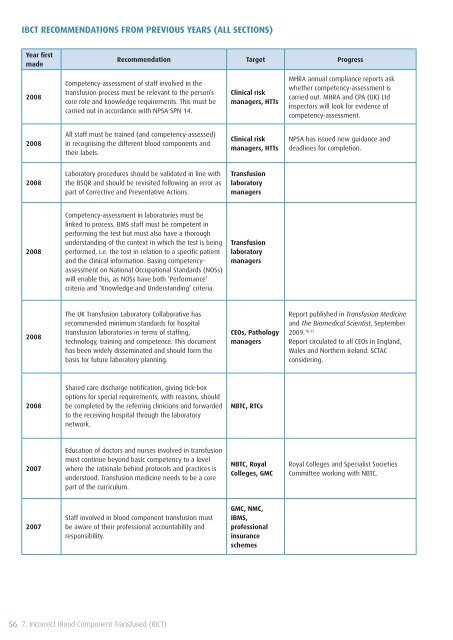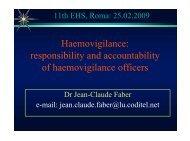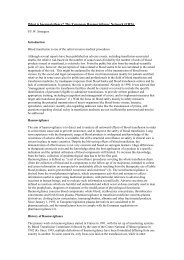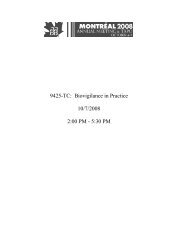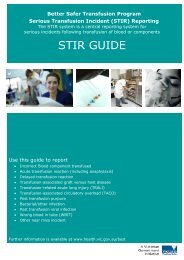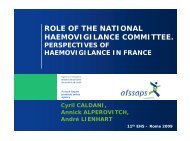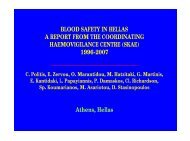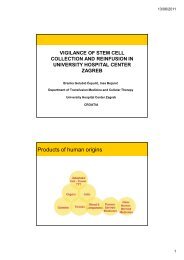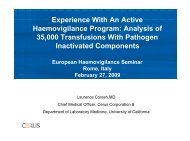SHOT Annual Report 2009 - Serious Hazards of Transfusion
SHOT Annual Report 2009 - Serious Hazards of Transfusion
SHOT Annual Report 2009 - Serious Hazards of Transfusion
Create successful ePaper yourself
Turn your PDF publications into a flip-book with our unique Google optimized e-Paper software.
IBCT RECOMMENDATIONS FROM PREVIOUS YEARS (all sections)<br />
Year first<br />
made<br />
Recommendation Target Progress<br />
2008<br />
Competency-assessment <strong>of</strong> staff involved in the<br />
transfusion process must be relevant to the person’s<br />
core role and knowledge requirements. This must be<br />
carried out in accordance with NPSA SPN 14.<br />
Clinical risk<br />
managers, HTTs<br />
MHRA annual compliance reports ask<br />
whether competency-assessment is<br />
carried out. MHRA and CPA (UK) Ltd<br />
inspectors will look for evidence <strong>of</strong><br />
competency-assessment.<br />
2008<br />
All staff must be trained (and competency-assessed)<br />
in recognising the different blood components and<br />
their labels.<br />
Clinical risk<br />
managers, HTTs<br />
NPSA has issued new guidance and<br />
deadlines for completion.<br />
2008<br />
Laboratory procedures should be validated in line with<br />
the BSQR and should be revisited following an error as<br />
part <strong>of</strong> Corrective and Preventative Actions.<br />
<strong>Transfusion</strong><br />
laboratory<br />
managers<br />
2008<br />
Competency-assessment in laboratories must be<br />
linked to process. BMS staff must be competent in<br />
performing the test but must also have a thorough<br />
understanding <strong>of</strong> the context in which the test is being<br />
performed, i.e. the test in relation to a specific patient<br />
and the clinical information. Basing competencyassessment<br />
on National Occupational Standards (NOSs)<br />
will enable this, as NOSs have both ‘Performance’<br />
criteria and ‘Knowledge and Understanding’ criteria.<br />
<strong>Transfusion</strong><br />
laboratory<br />
managers<br />
2008<br />
The UK <strong>Transfusion</strong> Laboratory Collaborative has<br />
recommended minimum standards for hospital<br />
transfusion laboratories in terms <strong>of</strong> staffing,<br />
technology, training and competence. This document<br />
has been widely disseminated and should form the<br />
basis for future laboratory planning.<br />
CEOs, Pathology<br />
managers<br />
<strong>Report</strong> published in <strong>Transfusion</strong> Medicine<br />
and The Biomedical Scientist, September<br />
<strong>2009</strong>. 10,11<br />
<strong>Report</strong> circulated to all CEOs in England,<br />
Wales and Northern Ireland. SCTAC<br />
considering.<br />
2008<br />
Shared care discharge notification, giving tick-box<br />
options for special requirements, with reasons, should<br />
be completed by the referring clinicians and forwarded<br />
to the receiving hospital through the laboratory<br />
network.<br />
NBTC, RTCs<br />
2007<br />
Education <strong>of</strong> doctors and nurses involved in transfusion<br />
must continue beyond basic competency to a level<br />
where the rationale behind protocols and practices is<br />
understood. <strong>Transfusion</strong> medicine needs to be a core<br />
part <strong>of</strong> the curriculum.<br />
NBTC, Royal<br />
Colleges, GMC<br />
Royal Colleges and Specialist Societies<br />
Committee working with NBTC.<br />
2007<br />
Staff involved in blood component transfusion must<br />
be aware <strong>of</strong> their pr<strong>of</strong>essional accountability and<br />
responsibility.<br />
GMC, NMC,<br />
IBMS,<br />
pr<strong>of</strong>essional<br />
insurance<br />
schemes<br />
56 7. Incorrect Blood Component Transfused (IBCT)


